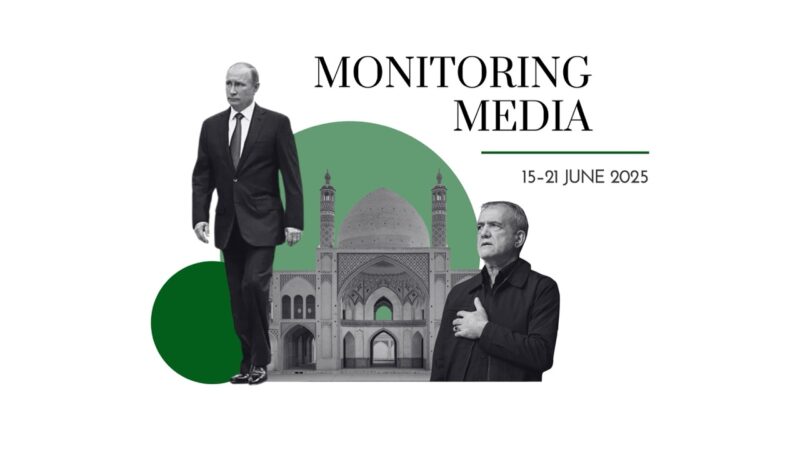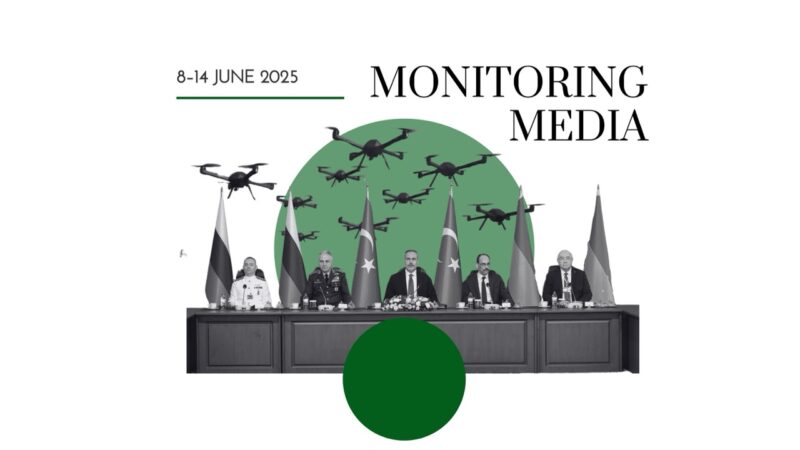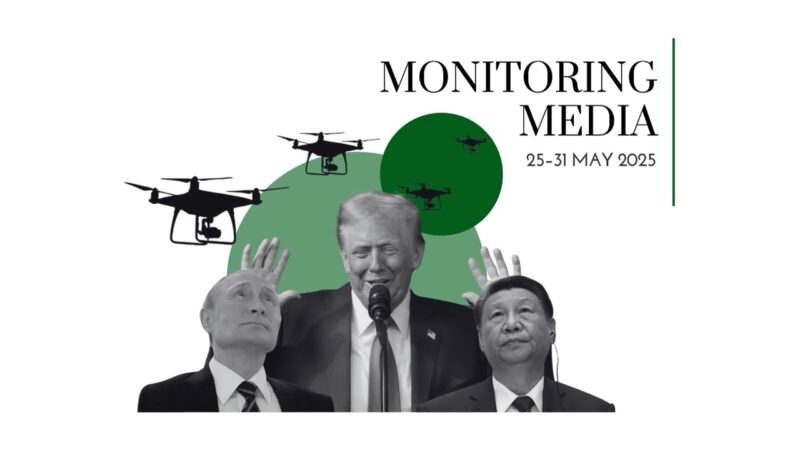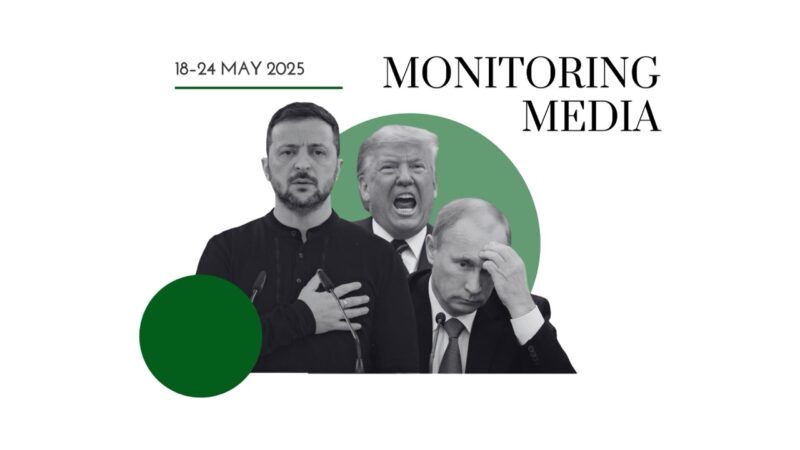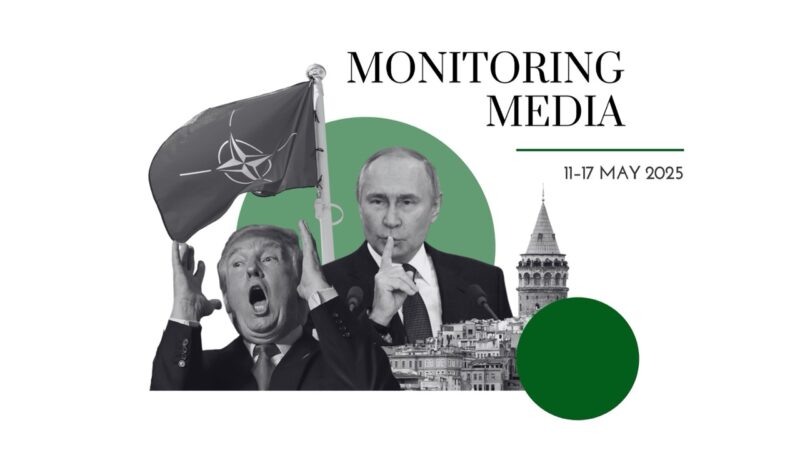Ukraine’s arms industry is the “Wild West”
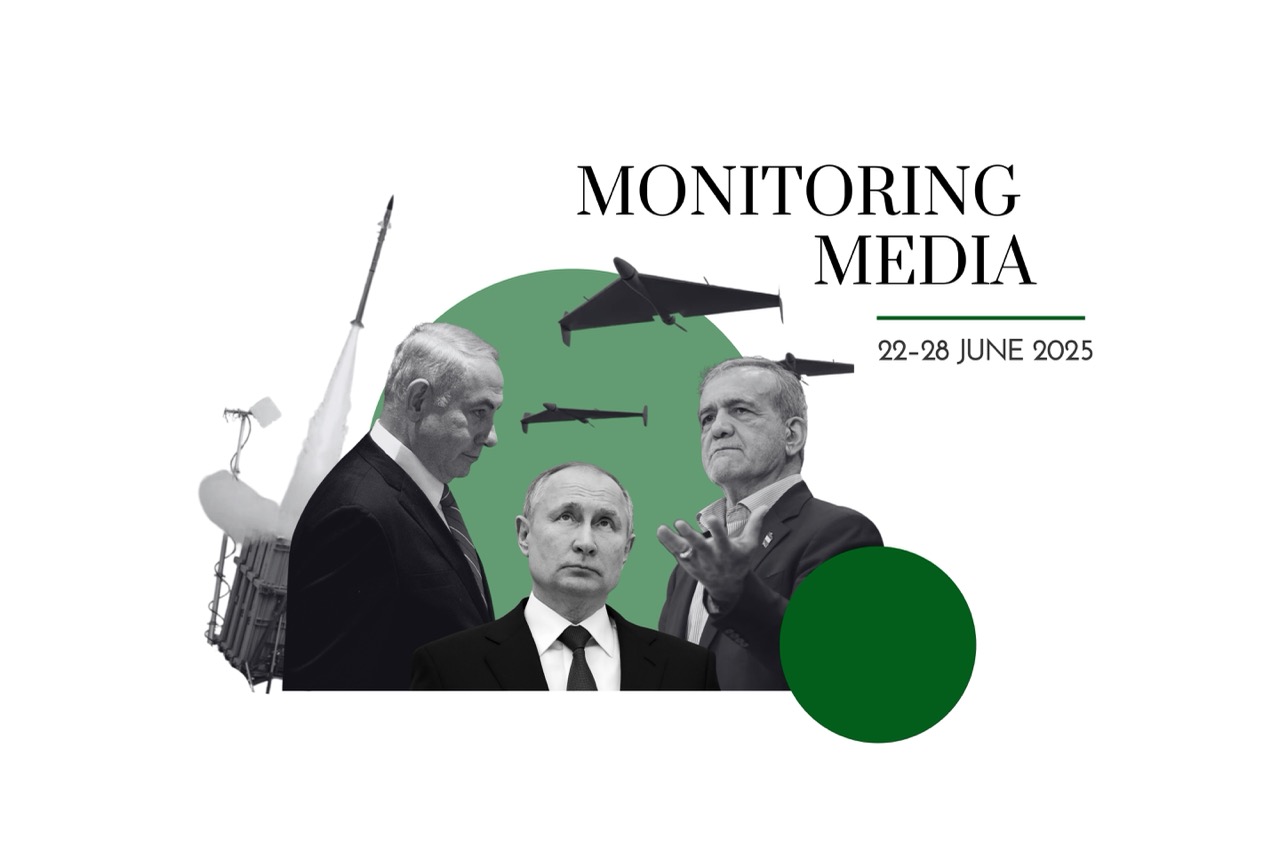
CIUS weekly report on North American media coverage of Ukrainian affairs, 22–28 June 2025
Five publications (The National Interest, Globe and Mail, Foreign Policy, The Macdonald-Laurier Institute, and Foreign Affairs) were selected to prepare this report on how Ukraine has been portrayed in the North American press during the past week. The sample was compiled based on their impact on public opinion as well as on their professional reputation, popularity among the readership, and topical relevance. These publications represent centrist viewpoints on the political spectrum.
This MMS report covers only the most-read and relevant articles about Ukraine, as ranked by the respective North American publications themselves in the past week. Its scope covers promoted articles on home pages and articles from special sections on Ukraine, with the hashtag #Ukraine, from the paper editions of the publications, and about Ukraine from opinion columns and editorials.
Featured topics
- The world and Ukraine: Ukraine’s arms industry is the “Wild West”; Ukraine’s homegrown glide bomb aims to bypass Western limits, faces hurdles.
- Russia at war: the war between Israel and Iran poses a threat to Russia; Canada is capable of undermining Russia’s economic ability to wage war; Russia–North Korea alliance poses a global security threat.
MMS summaries
The war between Israel and Iran poses a threat to Russia. Mikael Pir-Budagyan (National Interest) believes that the war between Israel and Iran poses a serious strategic threat to Russia. In the short term, the Kremlin stands to gain from an escalation of the military conflict in the Middle East, provided that the Iranian regime remains in power. First, Moscow will receive additional income from the sale of energy resources and can use them to finance its war against Ukraine: “For Russia, any price above the G7 cap of $60 a barrel means a substantial resource increase to fund its continued military campaign in Ukraine.” Second, the conflict in the Middle East will also divert the West’s attention away from Ukraine: “From Moscow’s perspective, every piece of [Western] military equipment sent to the Middle East is one less asset available to Ukraine.” However, possible uncontrolled escalation of the military conflict poses a significant threat to the Russian Federation. First, there is an increased risk of a nuclear accident as a result of air strikes on uranium enrichment or storage facilities. Second, a low-intensity conflict could trigger a crash weaponization programme, which would be contrary to Moscow’s interests. Third, continuation of the conflict could lead to US intervention in the process, which would destroy the existing status quo. Fourth, it could lead to regime change in Iran: “The prospect of regime change in Iran remains a significant concern for Russia, a goal now openly pursued by Israel. Such a change would severely undermine Russia’s regional influence, especially following the loss of its allied regime in Syria.” Fifth, “A prolonged and escalating war could leave Russia vulnerable to opportunistic neighbors seeking to expand their influence near its perceived sphere of influence.” Sixth, the Kremlin is afraid of being drawn into an active conflict, given the complexities of Russia’s war against Ukraine. Seventh, Moscow fears that its intervention in the Middle East would lead to a cooling of relations with the White House. According to Pir-Budagyan, “Moscow’s calls for de-escalation may seem contradictory, given Russia’s ongoing military campaign in Ukraine. However, in the case of Iran, many of Russia’s concerns about nuclear proliferation and possible ways to contain it should resonate with more pragmatic voices in a divided Washington.”
Canada is capable of undermining Russia’s economic ability to wage war. John McKay and Marcus Kolga (Globe and Mail) argue that Canada can help its allies to break their dependence on Russian energy. Two important factors underscore this potential. First, Canada must acknowledge that it is not powerful enough to dictate global demand for hydrocarbons. Second, Ottawa should realize that nevertheless it can influence how and where allies access their energy resources: “Canada is well positioned to become the trusted alternative supplier our allies need.” Moscow has turned energy into a weapon: “Russian oil and gas don’t just heat homes—they finance the invasion of Ukraine, repression in Belarus and influence operations in Canada and across Europe.” Ottawa should treat the construction of LNG terminals in eastern Canada—and deepwater ports for oil exports—as national strategic priorities: “Federal and provincial governments should fast-track approvals and mobilize investment. Pipelines from Western Canada can bring natural gas to the Atlantic coast, where it can be liquefied and shipped to NATO allies—displacing Russian gas and reinforcing European energy security.” According to McKay and Kolga, “Just as the Allies once choked off Nazi access to oil, we must now help cut the financial lifeline of Mr. Putin’s war. Canada must become the supplier of choice for countries that choose freedom.”
Russia remains on the sidelines of the Israeli-Iranian conflict. Dimitar Bechev (Foreign Policy) asserts that Russia will not interfere in this round of Israeli-Iranian confrontation. Moscow will try to appear neutral in the conflict between Tehran and Jerusalem, offering its services as a peacemaker. This decision is due to both the Kremlin’s weakness and its contradictory motives: “Russia’s interests require it to navigate a complex set of relationships with regional players, including Iran’s adversaries and competitors.” The prospect of regime change in Tehran is indeed worrying for the Kremlin, but a nuclear Iran is also not in Russia’s interests, “as demonstrated by Moscow’s support for U.N. Security Council sanctions against Iran in 2010.” Tehran’s advantages as an ally are also diminishing for Moscow: “After all, Shaheds are now manufactured in Russia, complete with key upgrades such as jet engines and Starlink-enabled navigation components.” According to Bechev, “Russia’s course ultimately reflects its own limited clout in the Middle East. As much as it envies Washington, Moscow is in no position to replace the United States as a linchpin of the regional order. Nor will it ever have as much skin in the game as local states. Russia’s priority remains subjugating Ukraine and maintaining primacy in the post-Soviet space. This leaves it both opportunistic and somewhat risk averse in the Middle East.”
Ukraine’s arms industry is the Wild West. Luke McGee (National Interest) believes that the combat experience of Ukrainian soldiers can give the country’s manufacturers an advantage. During the years of Russia’s war against Ukraine, Kyiv has significantly increased the capacity of its military-industrial complex: “On top of receiving [Western] missile defenses, drones, and more conventional artillery, Ukraine has developed its own impressive arms industry. Much attention has been paid to its manufacturing of attack drones—2.5 million drones are expected to be produced in 2025. Since the start of the war, Ukraine has built an arms industry with an output capacity of over $35 billion.” While actively preparing for Moscow’s summer offensive, Kyiv still has a surplus of weapons: “Recent estimates suggest that only around $12 billion, according to Ukrainian officials, worth of orders have been placed, meaning there is a huge amount of excess capacity.” Kyiv hopes that Western allies will take advantage of this opportunity to invest in Ukraine’s defence industry. According to McGee, “Western arms companies willing to invest in or work directly with the Ukrainian defense industry will have real competitive advantages in the fast-changing, high-tech world of modern weapon design. They will also be able to say with absolute certainty what works on the battlefield and what doesn’t.”
Russia–North Korea alliance poses a global security threat. Ankit Panda (Macdonald-Laurier Institute) notes that Russia’s deepening alliance with North Korea represents Pyongyang’s most significant geopolitical opportunity since the early 1990s and poses major implications for regional and global security. The author argues that Russia’s full embrace of North Korea is a strategic shift: “Putin has fully embraced Kim Il Sung’s grandson, Kim Jong Un, as a partner in war and as a comrade in Moscow’s broader struggle against the Western-led international system.” This partnership is already delivering tangible benefits, with North Korean arms and troops easing the pressure on Russian resources, while Moscow is believed to be compensating Pyongyang with military technology and political recognition. Of particular concern is potential Russian assistance that could improve North Korea’s conventional capabilities, such as “anti-tank guided missiles, electronic warfare capabilities, and intelligence, surveillance, and reconnaissance technologies,” which would enhance the effectiveness of the Korean People’s Army in both limited and full-scale conflicts. Panda warns, however, that technical cooperation may go even further, possibly aiding North Korea’s nuclear and space ambitions. Article 10 of the 2024 Russia–North Korea treaty provides legal grounds for collaboration on “peaceful nuclear energy,” which the author notes “could prove a useful fig leaf for meaningful technology transfer” to support North Korea’s goal of expanding its stockpile of fissile material. The author also raises concerns about Russian contributions to North Korea’s space program, noting that after Kim’s visit to the Vostochny Cosmodrome, Pyongyang tested a new space launcher using cryogenic propellants, which may “circumstantially indicate possible technical co-operation with Russian experts.” The potential impact of Russia–North Korea technical cooperation is significant, but Pyongyang is unlikely to obtain the full extent of irreversible technological know-how it desires—especially if the war in Ukraine reaches a resolution or stabilizes in 2025. Such a shift would reduce Moscow’s immediate need for support from North Korea, making it less likely that Russia would broaden the scope of its collaboration.
Europe confronts NATO crossroads as Trump upends transatlantic order. Gideon Rose and Erik Jones (Foreign Affairs) argue that Donald Trump’s second presidency has upended the foundational assumptions of the transatlantic alliance, pushing Europe to confront its long-standing dependence on American security guarantees and begin investing in its own defence. Trump’s return has been marked by open hostility toward NATO allies, with his administration rejecting the postwar liberal order in favour of “nineteenth-century great-power predation.” Rose and Jones note that “the Trump administration’s antagonism toward the traditional transatlantic alliance could be the most consequential trigger of further European integration since the groundwork for the EU was laid in 1948.” European powers, jolted by US threats of abandonment and shifting commitments, have responded with unprecedented defence spending and strategic initiatives, including Germany’s pledge to invest up to €600 billion in defence and the European Commission’s proposal for €150 billion in new military loans. At the same time, Europe’s awakening remains tentative and fragile, and much depends on whether Trump moderates his approach. The authors warn that “even as European governments took initial steps toward remilitarization and self-help, they watched closely to see whether Trump’s threats to abandon Ukraine and Europe more generally would be forgotten, too.” If Trump continues on his current path and Europe fails to consolidate its efforts, the alliance may fall into a state of “toxic codependence,” undermining collective security and opening doors to further Russian and Chinese influence. As the upcoming NATO summit looms, the authors conclude that the outcome will be decisive: “What happens at the alliance’s June meeting and after will cap a season—or cap an era.”
Ukraine’s homegrown glide bomb aims to bypass Western limits, faces hurdles. Brandon J. Weichert (National Interest) examines Ukraine’s development of a domestically produced glide bomb, dubbed the “Ukrainian KAB,” as a strategic response to Western restrictions on the use of long-range munitions. Weichert argues that this innovation “circumvents these restrictions, enabling Ukraine to strike strategic targets within Russian territory” and offers Kyiv greater flexibility amid growing geopolitical constraints. The KAB enhances Ukraine’s standoff strike capabilities, particularly as Russia’s own glide bombs now threaten major cities like Kharkiv and Zaporizhia. The KAB, combined with Ukraine’s electronic warfare advances such as the Lima Jammer, could create a “synergistic effect” by both degrading Russian attacks and enabling deeper Ukrainian strikes. However, the author tempers optimism with realism, noting the considerable challenges to scaling and deploying the KAB effectively. Ukraine lacks stable funding, with the producing firm, Medoid, resorting to “launching a fundraising campaign to scale the development,” as government certification and support remain uncertain. Additionally, Russia’s robust air defences and electronic warfare pose significant obstacles. The author warns that “Russian jammers have consistently proven effective” and may undermine the KAB’s success despite its inertial backup systems. While Ukraine’s innovation is “admirable,” the war’s duration and resource strain mean such efforts are “almost certainly insufficient to overcome the inherent advantages the Russians now enjoy.”
